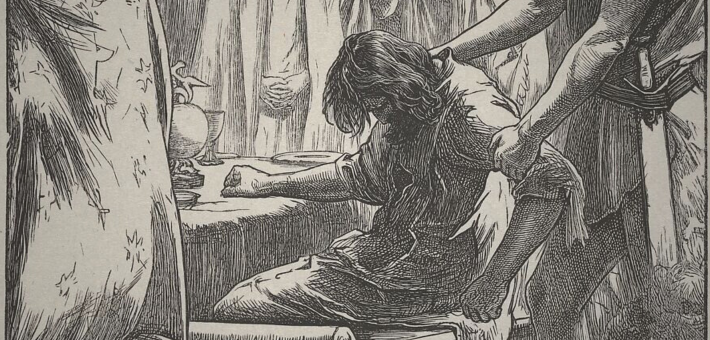Commentary on Matthew 22:1-14
After the parable of the Wicked Tenants (21:33-46), Jesus gives another parable of the Wedding Banquet in 22:1-14. In this parable, the kingdom of God is compared to a king who invites wedding guests for his son. But what can we learn about the kingdom of God since this king is hard to understand, given his violence against the invited guests who rejected his invitation and his harsh treatment of a wedding guest who did not wear a wedding robe?
Before we begin to explore this parable, one caveat is necessary. A parable is not intended for literal interpretation. It is not a real-life story but a fictional, subversive story that surprises audiences. While the allegory may be seen in a parable, it should not control its meaning because the parable employs subversive language that reverses traditional thinking or systems. Allegorical interpretation is easy to understand but loses its pungent critique of traditions or myths undergirding society. We do not have to make arbitrary links between textual elements and external references. For example, while the king is like God in some sense, he is not the same as God. Likewise, his son is not Jesus. His slaves who went out to call the invited guests are not prophets, and invited guests are not Israel. The king’s violent response is not the same as the fall of Jerusalem. Allegorical interpretation is not wrong but has limitations because it tones down the deeper, radical, urgent message of the kingdom of God in everyday life.
Indeed, the allegorical interpretation cannot explain the complexities in the parable of the wedding banquet. For example, the question is, Why did the king not invite everyone on the main streets, both good and bad, to his banquet from the beginning? Why did he discriminate against those marginalized people because he did not invite them initially? How could the invited guests reject the king’s invitation? Such rejection is unreal and social death in a traditional society where a patron-client system is prevalent and unavoidable. Furthermore, the king’s extreme violence against the refusing guests and harsh treatment of a guest who did not wear a wedding robe can hardly make sense if he is compared to God.
Then, going back to the question raised at the beginning of this commentary, what can we learn from this parable even if the kingdom of God is compared to a king? What is the radical, subversive message of this parable? One possibility is to focus on the literary context of this parable where Jesus challenges the uncaring work of the chief priests and the elders. In other words, this parable is a continuation of the earlier two parables, Two Sons and the Wicked Tenants because nothing is more important than doing the will of God. Even though they were called/invited by God to do his work, they neglected it, making themselves busy with their own businesses. But God does not give up on his work of saving people and calls others for that task. The subversive message is that the position and authority of religious leaders/elites will not last forever because God will open a new door, break traditions into pieces, and continue his work through other people. The way of God is radical and revolutionary in that regard. So much so that the initial invitation extends to all others, whoever they are. Tests are fair and given to all. Nothing is taken for granted. One must prove faith in the work of righteousness as Jesus said John showed it: “For John came to you in the way of righteousness, and you did not believe him, but the tax collectors and the prostitutes believed him, and even after you saw it you did not change your minds and believe him” (21:32). Those who respond to God’s invitation and do his work are worthy of God’s kingdom and the eschatological banquet.
In Matthew’s context, this parable challenges the community members to do the work of God because they were called and invited by God. If they do not continue to do so, they will lose their seat at the ultimate banquet. As God’s servants, they should not discriminate against anyone; rather, they must invite everyone from the beginning, both the good and bad. In this sense, the king’s behavior in selecting wedding guests is not prudent. The proper conduct of the king is shown in his second action: he sends his servants to everyone on the streets. Of course, as we saw before, the king’s selection of guests may be understood in a good way, that they are given special tasks for him. At any rate, the king’s later action is clear and consistent with Matthew’s theology that God’s love extends to all. God “sends rain on both the righteous and on the unrighteous” (5:45). He also “makes his sun rise on the evil and on the good” (5:45). The ultimate moral demand is to “love your enemies” (5:44). No one is excluded from the community of the beloved. This line of thought is also observed in the parable of Wheat and Weeds (13:36-43) and also in the parable of a Net (13:47-50). For Matthew, no judgment is possible until the end.
Also, Matthew puts this parable in the context of eschatology, that everyone must be ready for it by living the present wholeheartedly. Urgency or priority matters for faith. The former is seen in the parable of Treasure Hidden in the Field or the parable of Pearls. The latter is discussed in 6:25-34 where Jesus asks his disciples not to worry about worldly things. They must “seek first the kingdom of God and his righteousness” (6:33).
Lastly, Matthew puts this parable in the daily ministry context in which those who are called must prove their identity with the work of God. The title/position of a person or tradition of any sort is not a guarantee to please God or to serve people. God calls Jesus: “This is my beloved Son with whom I am pleased.” God’s voice confirms his baptism, his title, and his later work because we know Jesus the beloved Son did the work of God until he died. The wedding robe as a metaphor may allude to the provable Christian life for the kingdom of God. Otherwise, the harsh treatment of the guest who did not wear a wedding robe should not be understood out of context. For Matthew, final judgment is inevitable. But he does not feed fear to the members of the community. Rather, the desirable moral code is a positive one. Because God is loving and perfect, they must be also an imitator of him.
In the end, Matthew’s conclusion is in 21:14: “For many are called (klétos), but few are chosen (eklektoi).” “Called” is an invitation, and “chosen” means God’s approval of that call because of good outcomes. Jesus is called the beloved Son and pleases God. If one does not respond to God’s call by doing the will of God, such an invitation is futile and not realized in one’s life. Those who respond to God’s call are the chosen.



October 15, 2023